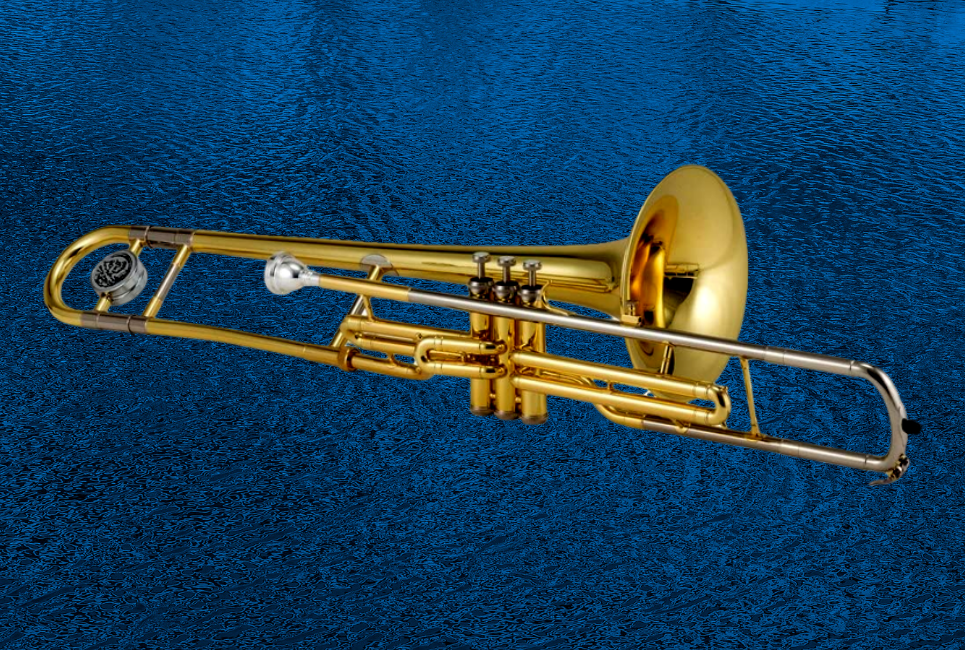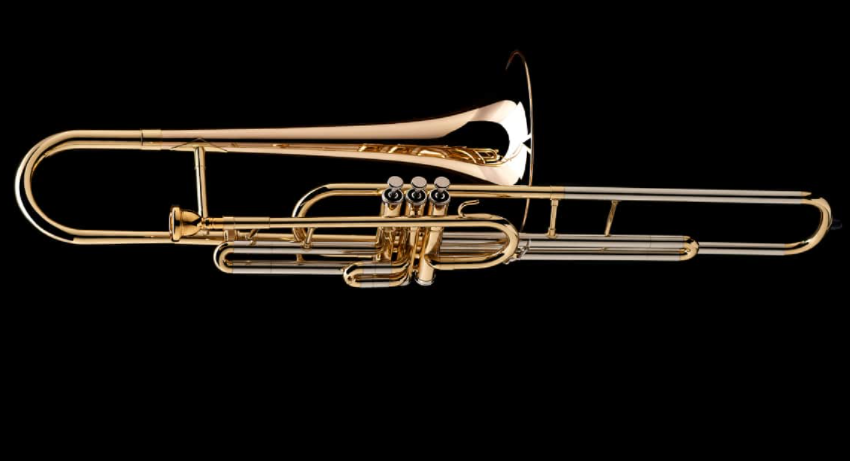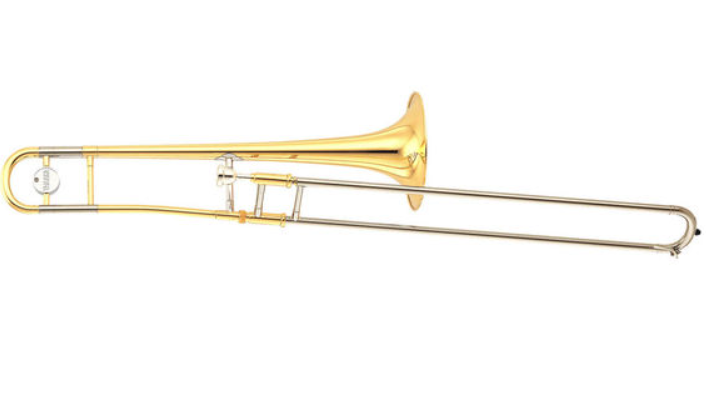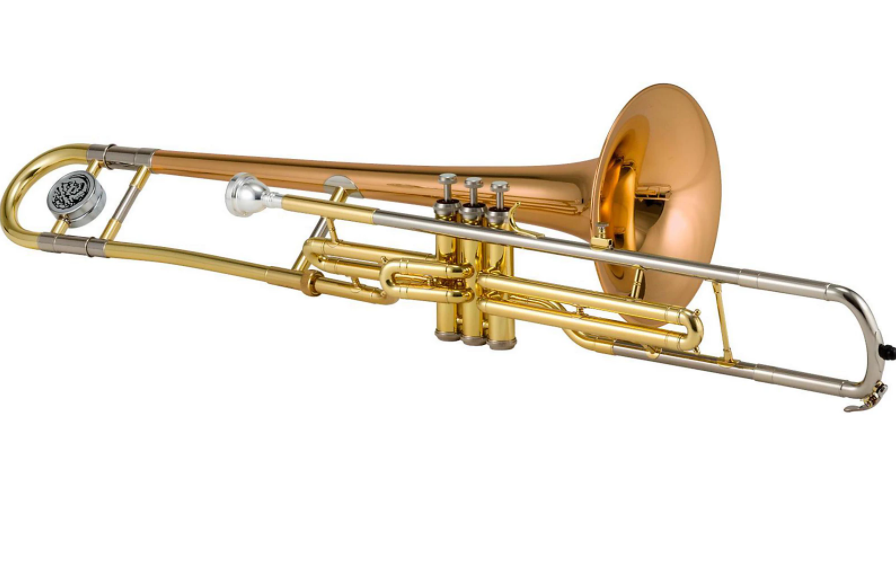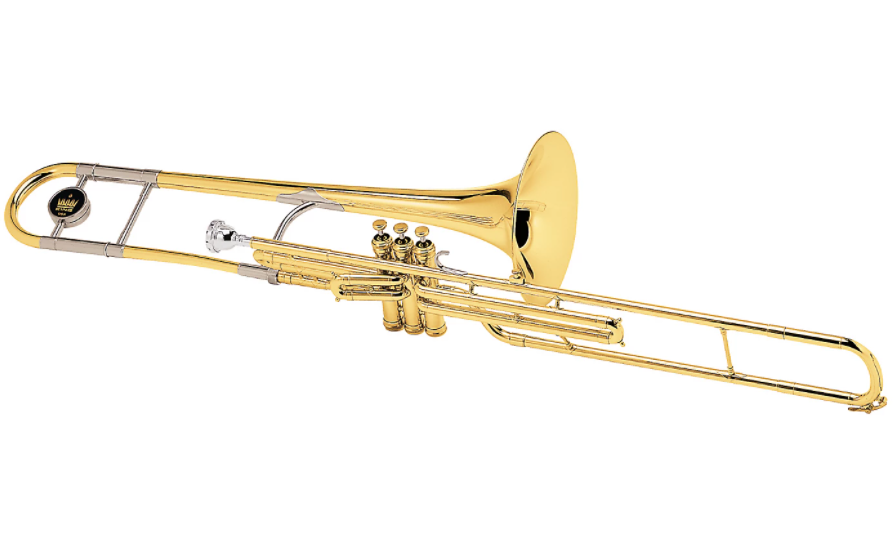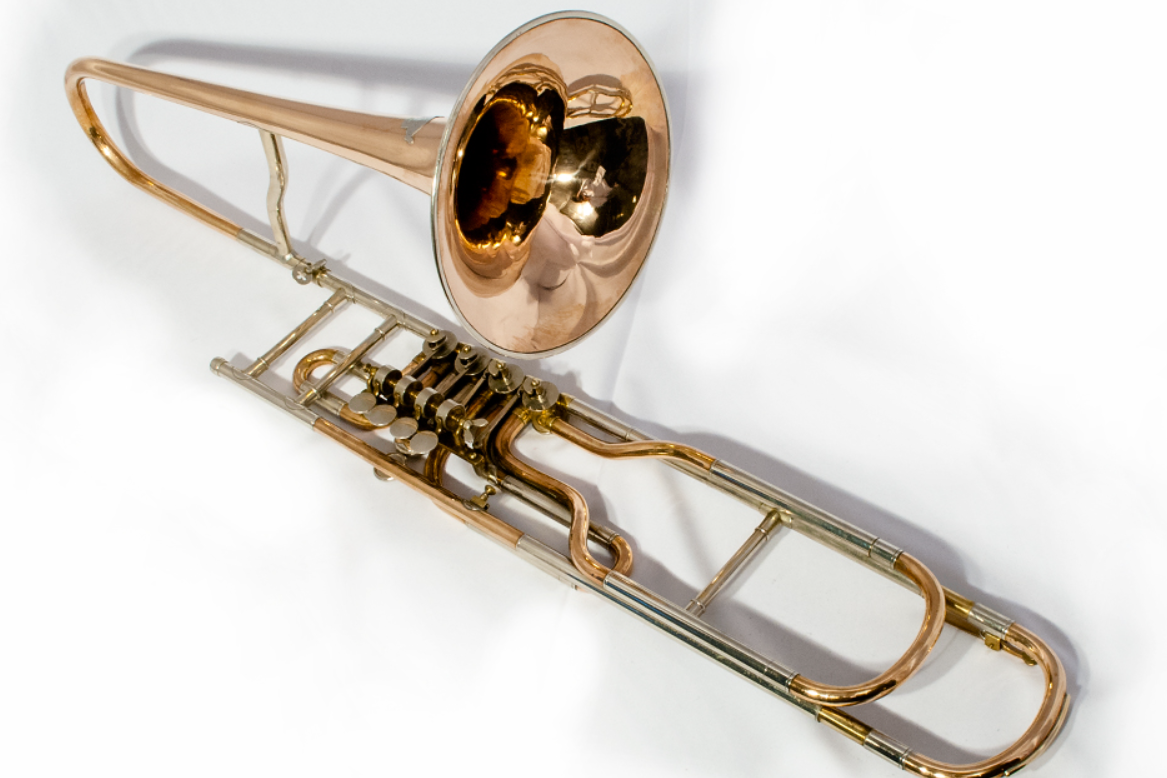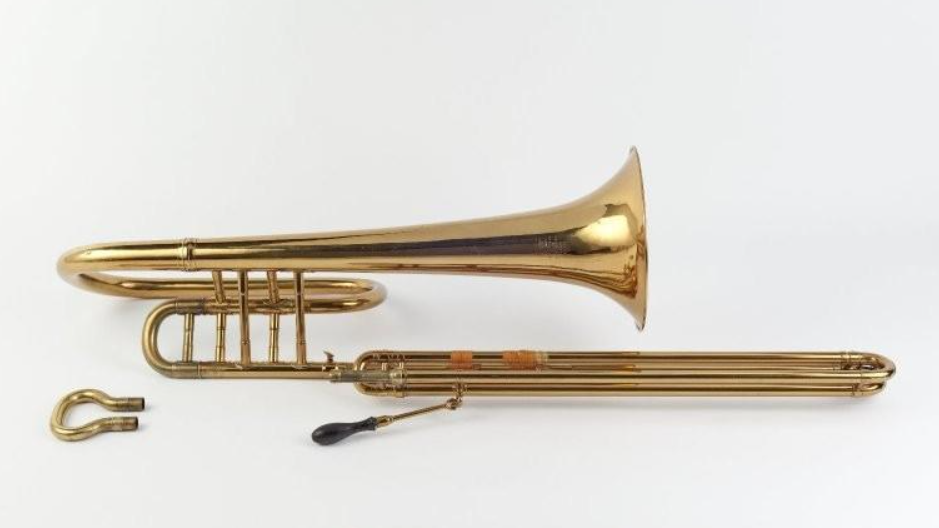- How to Find the Best Alto Trombone - May 31, 2022
- How to Find the Best Bass Trumpets - April 23, 2022
- Best Yamaha Saxophones Brand Guide - April 21, 2022
Many musicians use valve trombone primarily as a second instrument. Because the fingerings are identical (though an octave lower) to those on a trumpet, trumpeters can easily master the valve trombone once they learn bass clef. But the valve trombone can be so much more.
Valve trombones make uptempo passages easier since you can press valves faster than you can move a long slide. Jazz trombonists like Bob Brookmeyer and Juan Tizol of the Duke Ellington Orchestra have shown the world valve trombones can follow the changes. And valve trombones can even bring a note of authenticity to many Eastern European and 19th century works.
If you’re thinking about buying a valve trombone, you’re in luck! I’ve compiled information on some of the best valve trombones available today! Whatever your skill level or preferred genre, there’s a valve trombone out there for you, and I’m here to help you find it.
@jimm3rz It’s just too much power for any human. #trombone #valvedtrombone #bandtok #banddirector #teachersoftiktok
♬ original sound – Jimm3rz
How I Chose the Best Valve Trombones
The best tool is the one that does the job. When choosing a valve trombone, you need first to consider how you will be using your new instrument. Do you want your valve trombone as a second instrument that you may play a few times a year, or is this going to be the trombone with which you earn your degree or your living? Are you going to be playing in a jazz ensemble, symphony orchestra, or Latin band? Are you a beginning musician or a seasoned professional?
I chose the best valve trombone for musicians at different skill levels and for players in different genres. These instruments will all sound great in the hands of a skilled musician. Some are more economical and aimed at beginners and more casual players, while others will be more suitable for advanced musicians. But all of them are solid, reliable instruments.
If you are shopping for your first valve trombone, you may want to shop at a local music center or instrument store. Research is great, but there’s no substitute for trying a few valve trombones out in person. A knowledgeable salesperson can answer your questions and guide you toward the instrument that best fits your needs and budget.
Best Valve Trombones
Best Second Instrument Valve Trombone: Wessex PB901
For a lot of musicians, the valve trombone is something they use occasionally when they want to play something different. At under $600, the Wessex PB901 will let you add a new instrument without breaking the bank. Younger and smaller students will appreciate the PB901’s shorter length, and older students will appreciate its easy valve action.
Wessex instruments are made in China by a British/Chinese firm that offers instruments at a variety of price points. Wessex has better quality control and customer service than most of the anonymous Amazon importers. While it lacks some of the bells and whistles of more expensive valve trombones, the PB901 will stand up to regular use, rehearsal, and onstage appearances.
Valve trombones use the same fingerings as trumpets. If you want to play some trombone lines without mastering the slide, the PB901 will take things down an octave. You will still have to learn bass clef and get used to reading music at concert pitch since the trombone is a non-transposing instrument. But the PB901 will let you master the new embouchure and breathing and serve you through most musical situations.
Pros
- Inexpensive second instrument
- Shorter size makes it good for students
- A great introduction to valve trombones
Cons
- Advanced valve trombone players may want a better instrument
Specifications
- Bell: 8″ (202mm)
- Bore: 0.49″ (12.49 mm)
- Length overall assembled 28″ (71cm)
- Weight: 3.71 lbs (1.65kg)
- Gold brass bell
- Nickel inner and outer slides
- Stainless steel top sprung slides
- Lightweight foam body case
- 6 3/4 mouthpiece
Best Student Valve Trombone: Yamaha YSL-345V
Yamaha is one of the world’s leading manufacturers of student and professional instruments. If you are serious about mastering the valve trombone, the Yamaha-YSL345V will help you become the best valve trombonist you can possibly be. The YSL-345V is the valved version of Yamaha’s YSL-345, one of the world’s most highly regarded student and marching trombones.
Many slide trombonists complain that valve trombones feel stuffy and hard to play in tune. The YSL-345V has a .500″ bore that makes it more free-blowing than most valve trombones. And because it is built with young students in mind, the YSL-345V stands up to the rigors of rehearsal and road trips. See my earlier pieces on the best Yamaha slide trombones and the best Yamaha trumpets for more details on why Yamaha is such a great choice for student instruments.
Like Yamaha’s other student instruments, the YSL-345V punches well above its weight. It might not be a professional valve trombonist’s first choice for a gig, but a professional could get studio-quality sound from a YSL-345V. And that professional might well keep a YSL-345V at home for practice and as a backup.
Pros
- Wider bore makes this a free-blowing instrument
- Yamaha is famous for its quality control and reliability
- The 345V is the valved version of one of the world’s most popular student trombones
Cons
- Considerably more expensive than the Wessex
Specifications
- .500″ bore
- 8″ bell
- Gold brass mouthpipe
- Yellow brass outer slide
- Nickel-plated pistons
- Detachable balance weight
- Lacquer finish
Best Latin Valve Trombone: Jupiter JTB720V Series C
Since the 1920s, Mexican banda ensembles have featured valve trombones carrying the lower harmonies while a sousaphone keeps the beat. Valve trombones are also commonly found in Salsa and Afro-Latin bands. If you want a trombone with the power to stand out at a noisy party, the Jupiter JTB720V Series C is the instrument for you. Its bright, crystalline sound will shine on solos yet blend nicely in a supporting role.
C valve trombones are the most common trombone in Central and South America. Many Latin musicians buy B♭ valve trombones and have the tubing cut down to C length. This trombone comes in the key of C so that no surgery will be required.
Jupiter’s brass instruments are highly regarded for their tone and their price-to-value ratio. The JTB270V comes in at under $1,400, a very reasonable price for what you get. If you want to play music from South of the Border, the 720V Series C will let you play on an instrument befitting the genre.
Pros
- Bright and penetrating tone
- Very reasonably priced for a high-quality instrument
- Authentic instrument for much traditional Latin brass music
Cons
- Because the trombone is in C, B♭ instrument players will have to learn new fingerings.
Specifications
- Key of C
- Lacquered Brass Body
- 8″ Bell
- Stainless Steel Pistons
- .482″ Bore
- Nickel Silver Main Outer Slide
- Wood-Frame Case
Best Jazz Valve Trombone: King 2166 3B
The King 3B has been a staple in jazz recording studios since the days of bebop. King’s 2166 is their valved take on the 3B design. The 2166 has a clear, forward sound that works fabulously for jazz and rock sessions.
While King trombones can play as loud as you would like, you need good breath control. When playing a King there’s a fine line between a swelling double-fortissimo and an overblown blatt. If you have the chops, the 2166 will give you a sparkling, fluid tone across every dynamic range. This may require lots of practice, but the 2166’s smooth pistons will make those long hours of rehearsal a joy.
The 2166 sound works well for chamber and ensemble jazz and can even be used for mid-19th century French Romantic music. (While rotary valves were popular in Eastern Europe, France and western Europe always favored pistons). Once you tame this temperamental beast, you’ll find it will sing in any genre you choose.
Pros
- A legendary jazz trombone, now with valves
- Incredible tone and great piston action
- A school band instrument you can use throughout your pro career
Cons
- Requires good breath control, may not be best for beginners
Specifications
- .481″ bore
- 8″ yellow brass bell
- Nickel-plated nickel silver pistons
- Clear lacquer finish
- King 12C mouthpiece
- 7566C wood shell case
Best Symphonic Valve Trombone: Červený CVT 571-4
For several decades in the mid-19th century, slide trombones were rarely found in orchestra pits. Valves allowed musicians to play faster and could be machined to better precision than often fussy slides. Vaclav Frantisek Červený (pronounced “Chair-venyi”) made many of those valve trombones, and since 1843 V.F. Červený has been creating fine brass orchestral instruments.
The Červený CVT 571-4 hearkens back to the instruments played at Brahms, Strauss, and Bruckner premieres and for a great deal of Czech and Eastern European music. The rotary valves give the instrument a tone more like the French Horn than the brighter and more staccato sound of piston valves. And the fourth valve (you can also order the 571-3 with three valves) gives the 571-4 the low range of a slide with an F valve attachment.
If you’re not used to rotary valve brass, the CVT 571-4 will have a learning curve. Rotary instruments are held differently and have different feel and feedback. But once you’ve mastered those, you’ll have an instrument that will come in very handy every time the local symphony wants to play something by Janacek or Smetana.
Pros
- A classic valve trombone built by one of Europe’s oldest instrument-makers
- The perfect sound for Romantic orchestral and brass works
- Warm mellow sound with valve speed
Cons
- Rotary valves may take some getting used to
Specifications
- Valves: 4 rotary valves
- Material: Yellow brass
- Bore: 12,4 mm (.490″)
- Bell: 240 mm (9,5″)
- Height: 1100 mm (43,3″)
- Weight: 2400 g (5,3 lbs)
- Mouthpipe: Nickel silver
- Finish: Lacquered
- Outfit: Silver-plated mouthpiece, hard case
My Recommendations
If you are a trumpet player who wants to pick up a second instrument, the Wessex PB901 will be the best valve trombone for your needs. The PB901 is a reasonably priced valve trombone that has good intonation and will let you apply your trumpet skills to a lower octave.
For jazz or Latin musicians, the King 2166 or the Jupiter 720V will be their best choices in valve trombones. The choice of a B♭ or C valve trombone depends on your personal preferences and the genre you are playing.
For symphonic or classical musicians, the best valve trombone is the Červený CVT 571-4. There is growing interest in period-appropriate instrument performances. The CVT 571-4 is not only period-appropriate, it is made by a company that was building trombones when many of these works were composed.
Alternatives
In recent years the cimbasso has become increasingly popular with orchestral and movie score composers. The cimbasso is a rotary valve version of the contrabass trombone. Popularized by Giuseppe Verdi, who notoriously loathed tubas, the cimbasso fell into obscurity but is now often used for period-authentic Verdi and Puccini and for contemporary works.
If you already play trumpet, you will have little trouble mastering the euphonium. The euphonium has a marvelous, velvety sound and also uses trumpet fingerings. See our guide on how to find the best euphonium for further details on adding this wonderful and versatile horn to your collection.
Frequently Asked Questions (FAQ)
Answer: Valves open and close lengths of tubing, thereby changing the instrument’s pitch. The piston valves you see on a trumpet or a tuba open the tubing when the player presses the key, then shut again when the pressure is released. When a rotary valve is depressed, the valve rotates 90 degrees and opens the connection. Piston valves have a cleaner definition between notes, while rotary valves have a more mellow and rounded sound.
Answer: The flugabone, or marching trombone, has the same length of tubing as a valve trombone but in a shorter wrap that makes it resemble a big trumpet. Like the flugelhorn (and unlike trumpets or trombones), the flugabone has a conical bore that rounds and softens its sound. The flugabone is popular with both trumpet and euphonium players and can also be an excellent substitute for the bass trumpet as it has the same range
Answer: A superbone is a hybrid trombone that combines a full set of valves with a slide. The superbone was used by jazz trumpeters Maynard Ferguson and Don Ellis in 1970s recordings. While theoretically, the superbone could combine the best of both valves and slides, in practice, tuning and intonation issues have made the superbone more of a novelty item than a regularly played instrument.
Conclusion
Valve trombones are not as popular in Europe and the Anglophone world as their slide cousins. But if you take your valve trombone playing seriously, you’ll see that valve trombones have a lot to offer. Whether you’re looking for a second instrument or want to specialize in valve trombone, you will find an instrument that suits your needs and helps you sound your best.
Whichever valve trombone you choose, happy playing!
Looking for more interesting readings? Check out:

